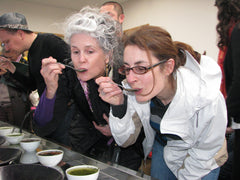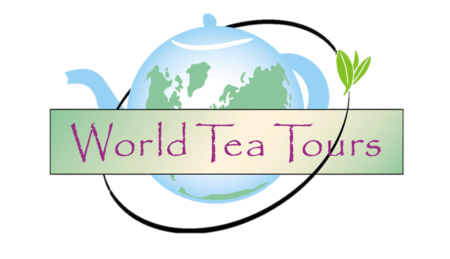Tea Tour of Japan - Itinerary
*** Sample Itinerary - Cost depends on itinerary and dates ***
             
|
Base Tour Day 2 - This morning we will start our day in the tea gardens of Ureshino, a tea producing center for several hundred years. We'll learn both manual and mechanical tea leaf harvesting and then bring our bounty back to the factory for processing. Ureshino is one of the few places remaining in Japan that still produces Kamairi Cha and we'll test our skills at all the hand-making steps. The technique is much different than the Temomi hand-made tea we'll see later in the tour. Compare our tea to the factories in a tea tasting session. After lunch we have a very special treat, a visit to one of the oldest surviving tea trees in Japan. Then it's back to town for a delicious dinner of local dishes. Day 3 - We head into the countryside today to Yame one of the famous tea producing areas. We'll meet an award winning tea farmer, tour his tea garden and factory and taste some of his teas. After lunch we'll continue to develop our palates with an introduction and tasting of some other teas produced in the area. In the afternoon we drive Westward to Kawachi. Day 4 - Cameras ready? Our first stop today is the Kawachi Fujien Wisteria garden and tunnels; world famous for their colorful and aromatic blossoms. And, we will be there just at peak season! After enjoying the scenery we coach back to Fukuoka for our train to Kyoto. Our dinner tonight is very special - the Kaiseki Ryori. A feast for all the senses, this meal has evolved from the multi-course repast that was served before formal tea ceremonies. We must arrive precisely on time. To top off the experience, the chef will visit us after his performance and describe the uniqueness of each dish. Our delightful meal is one of the specialties of famous Kyoto cuisine. Our home for the next three nights is in a Ryokan, a traditional Japanese style guest house. You may feel free to lounge about in the provided yukata robe and partake in the Onsen hot bath (separate baths for men and women). Day 5 - After a peaceful night's sleep on the fluffy futons, we delve into the spiritual side of Japanese culture starting with a visit to the Nanzenji Buddhist Temple. The serene rock gardens, comforting wooden floors, simplistic decor and intricate architecture blend to create a contemplative ambiance. In case we are in need of some refreshment, tea-time this afternoon will be at Ipodo, the oldest tea shop in Kyoto. The pottery workshops of Kiyomizu are world renowned. After lunch we'll see the historic Kiyomizu temple then visit a workshop to see how the unique styles of tea ware are made. Try your hand at making a tea bowl under the tutelage of a master potter. The traditional shops of Ninenzaka are filled with traditional arts and crafts. There is also a shop selling green tea ice cream! Day 6 - The Kinkakuji or Golden Pavilion is a must see spectacle. First built over 600 years ago,the top two floors are covered in gold leaf. Now a zen temple, it was the retirement residence of one of the shogun. Continuing our exploration of history, the secluded Kozanji Temple - the site of the oldest tea garden in Japan is our next stop. This unassuming structure, founded in the beginning of the 13th century and a World Heritage Site, is the spot where the first tea seeds were planted after being brought from China by the Zen Priest Eisai. Tonight's dinner is in a tea house in the infamous Gion, Kyoto's traditional pleasure district. If we are lucky we may see a Maiko (Geisha apprentice). The dress code is - Kimono! Get fitted in a real Kimono complete with tabi socks and wooden sandals and parade together through the town. Don't spill, the clothes are rented. Day 7 - As we say goodbye to Kyoto we will visit the Fushimi Inari Shrine, famous for it's Tori corridor. Then, we head out into the country-side to the village of Wazuka. We will meet with a local tea company and pick our own tea in their fields. Next comes the excitement of making our own tea in their workshop including spending some time turning the stone grinding wheel to make Mat Cha. We'll get a chance to sip the tea we made. Then, we transfer to our own tea-hostel. The traditional country-style accommodations (boys and girls in 2 separate rooms) include a unique shabu shabu (hot pot) dinner that uses the locally made Houji Cha as a broth. Before settling in for the night, relax in a specially prepared hot tub - of real tea! Day 8 - Next we are off to the historic city of Uji renowned for fine teas since 1160. We'll visit a modern tea factory to see the very unique processing method of Mat Cha, the powdered green tea used in the tea ceremony. Attend a short lecture on Mat Cha tea making and have a chance to taste some examples of this special tea. Also a source of earthenware for centuries, we will pay a brief visit to an ancient kiln to see the original way ceramics were fired. Full of caffeine we'll drive to the train station to catch the Bullet train to our next stop, Shizuoka. Day 9 - Our morning starts early with a visit to the lively tea auction market. See how tea is traded as it has been for generations. Afterward we'll drive to Okabe, famous for the famed Gyokuro green tea. Learn how this prized tea is grown and harvested and enjoy some cups of tea made by Gyokuro Master Tohei Maejima. Enjoy a tea ceremony at the Gyokuro-no-sato. Dinner is back in Shizuoka this evening. Day 10 - Today we take a day trip to Makinohara. Tour the National Tea Museum, walk around the beautiful garden and enjoy another style of tea ceremony demonstration in the tea house . Then we'll go into the class room in a lecture at the Tea Research Institute to learn the science of tea. After a specially prepared tea-lunch where each dish contains tea, we'll tour a tea processing factory and learn the steps in producing and refining Sencha - Japan's most popular tea. We'll also have a guided tea tasting of a selection of different teas from the area. We'll witness and try our hand at making the nearly lost art of Temomi - hand tea making. This evening, have a chance to interact with some of our new tea friends at dinner. Day 11 - After breakfast we drive to Shimada and board the famous steam-powered train up to Kawane. Tea growing is the main industry and we'll meet with some organic tea farmers to taste the village life. After taking in the rejuvenating, natural scenery, stay the night in the tea farmer's home. Day 12 - This morning we board our bus and drive toward iconic Mt. Fuji. Observe the revered peak from the scenic viewing center then wade through the tea bushes at a nearby tea garden. Taste some freshly made tea and build our courage for our re-entry into modern civilization and head for Tokyo. |
|
|
|
Tokyo 3 Day Post-Tour - The adventure continues in the bustling national capital,Tokyo where we'll enjoy more Japanese tea culture and history.
Day 2 - We will start the day with a visit to the serene Happoen garden with it's specially designed landscaping. As we walk down tree lined paths we'll stop at the tea house for a tea ceremony demonstration and enjoy some Mat Cha and tea sweets. After lunch we'll visit the Meiji Shrine built to commemorate the Meiji Emperor and his wife. A Shinto temple, it is also a popular spot for weddings. Before dinner we'll stop at a local tea shop to see how tea is sold. An optional visit to see a performance at the Kabuki Theater is available for those interested. Day 3 - Today we top off our training in Cha-no-yu, with hands-on, step-by-step instruction in the Japanese tea ceremony. Learn all the steps of both the host and guest. After lunch we lighten the mood with a little competitive shopping on the Ginza, Tokyo's famous shopping street. Share stories and favorite memories at our farewell banquet before heading for home in the morning.
|






